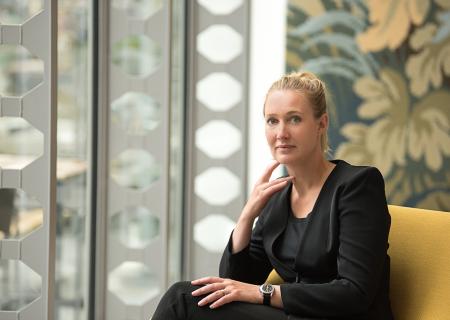Embracing change
Member Profile: Jo Allen
IQ recently spoke to Jo Allen, Chief Executive of Frogmore and member of the INREV Fund Manager Advisory Council. Frogmore has just seen the first closing of its fourth investment fund, which like its forerunners will be investing exclusively in UK real estate.
Allen says that for all the challenges associated with Brexit, investor demand for UK real estate and the kind of funds she manages is holding up well. ‘I can’t remember a time when there was more uncertainty around the world, whether in geopolitics, the environment or the economy, and in the eyes of most long-term real estate investors, the UK is still seen as a safe haven where the rule of law and sound financial practices prevail. And so far, there hasn’t been any dramatic distortion in UK property markets from Brexit. Except for the retail sector, values have held up and occupational markets are resilient - indeed there is still a squeeze on supply of Grade A office space in a number of UK regional centers. With investors globally searching for relatively secure sources of income and yield, UK real estate remains attractive.'
I can't remember a time when there was more uncertainty around the world
Given that Allen spoke to IQ early in October, when no exit deal between the UK and the EU had emerged, she stressed that any well-informed and intelligent observer would be unwilling to predict the eventual outcome. ‘But in many ways, it isn’t that critical for a multi sector investor like us,’ she suggests. ‘You can build success on being versatile, nimble and having the ability to adapt to changing circumstances, such as dramatic shifts in market pricing. For instance, through the global financial crisis it was important to have some dry powder available in case of a sudden repricing, and in some ways today’s situation is similar, at least in the UK.’
Allen confirms that Frogmore’s business is very much about understanding how real estate markets are changing, both in terms of short-term shifts but also long-run structural changes and finding assets that can leverage these shifts. INREV classifies Frogmore’s funds, which all follow a closed end, blind pool, discretionary model as value added, and Allen explains that this value often comes from 'heavy lifting asset management' - repositioning assets that have become obsolete to exploit the true potential of their locations, in many cases changing the mix of uses and ultimately crating core assets that can be easily and profitably liquidated in the marketplace.
'Real estate has undergone huge disruption in recent years,' says Allen ‘but at Frogmore, we have seen this as an opportunity, whether it be for restructuring retail units in London’s Oxford Street to meet the requirements of retailers who are successfully weathering the e-commerce revolution, or in creating a big logistics facility on a former mining site in the Midlands, for example. This is all about having the market knowledge to understand what is likely to work in a particular location and the expertise for instance in planning regulations and re-leasing – to make it happen.’
Allen also highlights that emerging demographic trends in society require new real estate solutions or adaptation of existing stock. Frogmore has a willingness to invest in less traditional sectors, including retirement living, student housing and data centres. ‘We selectively invest in the residential sector in response to market circumstances' says Allen 'which historically was a big area of activity for us'.
Recent acquisitions have included constructing a portfolio of dementia care facilities in Central London and ‘Extra care’ retirement homes on the South Coast.
A commitment to diversity is an important factor in attracting the younger generation of real estate professionals
Allen explains that having an appropriately skilled team with experience of implementing such strategies is crucial, but we must also attract the new talent and impart an understanding of the UK market that is second to none. For a niche operator competing in a market that is increasingly dominated by large global players, it’s essential to have an identifiable set of skills and a level of knowledge that investors can tap into.
‘A commitment to diversity is an important factor in attracting the younger generation of real estate professionals,’ Jo concludes. ‘To me that doesn’t just mean gender, but also race and social background. I see social diversity as crucial to the business, too. For instance, being able to communicate with local communities is critical for achieving the right tenant mix for projects in urban areas that are currently seen as less fashionable but which could still have strong growth potential. This means encouraging those from all backgrounds to come into real estate – something I try to foster through mentoring and involvement with ULI’s UrbanPlan UK and the Pathways to Property initiative at Reading University, which showcase the sector in a broad range of UK schools. Senior people have a key role to play in ensuring that the real estate industry is fully integrated with the rapidly changing world it aims to serve.’








